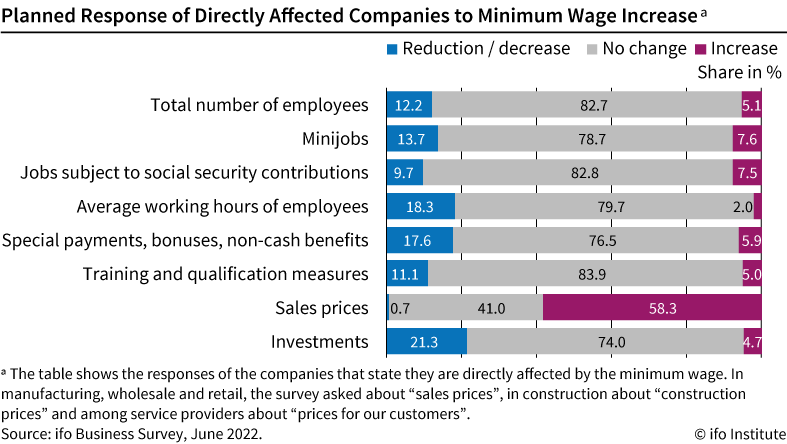Increase in the German Minimum Wage Is Passed On as Higher Prices
The increase in the German minimum wage on October 1 is causing many companies to raise their prices, finds the ifo Business Survey. The increase affects companies across almost all sectors of the economy. Of the participating companies, 30.7 percent employ staff for less than EUR 12 per hour; 58.3 percent are planning to respond with higher prices. “This will likely exacerbate inflation, which is already high,” says ifo labor market expert Sebastian Link. As of October 1, the German government is increasing the minimum wage from EUR 10.45 to EUR 12 per hour.
Price increases are the most frequently cited consequence of this. Only 12.7 percent of the companies affected are planning to cut jobs in response to the increase. A full 82.7 percent intend to keep the same number of staff that they have now, while 5.1 percent even want to increase headcount.
While 18.3 percent of the companies affected are planning to reduce their employees’ average working hours, 17.6 percent are considering cutbacks in additional wage components such as special payments, bonuses, and non-cash perks. What’s more, the companies affected are inclined to curb their investments as well as their training and qualification courses (21.3 percent and 11.1 percent) rather than expand them (4.7 and 5.0 percent). “Accordingly, the vast majority of the companies affected are planning neither to replace labor that has become more expensive with capital nor to invest in their employees’ knowledge to increase their productivity,” Link says.
Many of those surveyed expect their purchase prices to go up as a result of the minimum wage increase. This applies to almost half (49.4 percent) of the companies that are directly affected and 29 percent of the companies that aren’t directly affected. Furthermore, 52.8 percent expect profits to shrink, 32.4 percent expect competitiveness to weaken, and 23.3 percent expect demand to decline as a result of the minimum wage increase.
The extent to which the companies are affected depends heavily on regional differences. In western Germany, 29.1 percent of the participating companies employ staff for less than EUR 12 per hour; in eastern Germany, that number is 39.9 percent. There are also differences between industries: in hospitality, 78 percent of the companies surveyed employ staff for less than EUR 12 per hour; in accommodation, 65.1 percent of companies do so. When it comes to temporary employment, 63.5 percent of companies pay less than the new minimum wage; in land transport, that number is 46.7 percent. Also affected to an above-average extent are retail with 57.9 percent, the textile industry with 71.9 percent, and food and beverages with 61.4 percent of companies.
In June 2022, the ifo Business Survey asked special questions about the minimum wage increase and companies’ planned responses. Answers were received from 6,900 companies.



